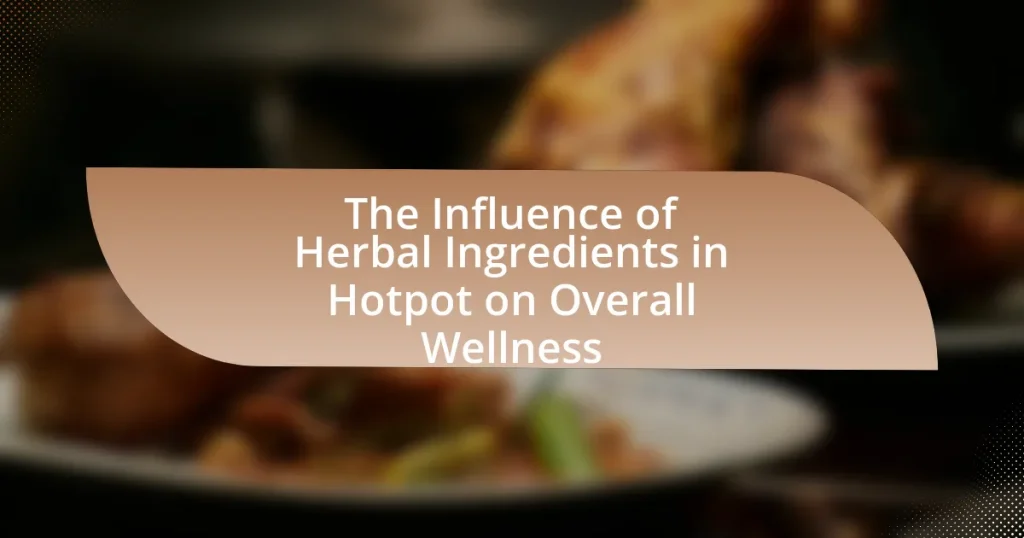The article focuses on the influence of herbal ingredients in hotpot on overall wellness. It explores various herbal components such as ginseng, ginger, garlic, and goji berries, highlighting their health benefits, including anti-inflammatory, antioxidant, and immune-boosting properties. The discussion includes how these herbs enhance the flavor of hotpot, their role in traditional medicine, and their impact on digestion and mental health. Additionally, the article provides best practices for selecting and incorporating these herbs into hotpot dishes to maximize their health benefits, supported by scientific studies that validate their wellness claims.

What are Herbal Ingredients in Hotpot?
Herbal ingredients in hotpot typically include a variety of plants and spices known for their health benefits, such as ginseng, goji berries, ginger, garlic, and various medicinal herbs. These ingredients are chosen not only for their flavor but also for their potential to enhance wellness, as many have been used in traditional medicine for their anti-inflammatory, antioxidant, and immune-boosting properties. For instance, ginseng is recognized for its ability to improve energy levels and reduce stress, while ginger is often used to aid digestion and alleviate nausea.
How do herbal ingredients contribute to the flavor of hotpot?
Herbal ingredients significantly enhance the flavor of hotpot by introducing complex aromatic profiles and depth to the broth. These ingredients, such as ginger, garlic, and various herbs, release essential oils and compounds during cooking, which infuse the broth with unique tastes and fragrances. For instance, ginger adds a spicy warmth, while garlic contributes a savory richness, both of which are essential in creating a balanced and flavorful hotpot experience. Studies have shown that the use of herbs not only elevates the sensory qualities of the dish but also provides health benefits, making the overall dining experience more enjoyable and nutritious.
What specific herbs are commonly used in hotpot recipes?
Commonly used herbs in hotpot recipes include cilantro, green onion, garlic, and ginger. These herbs enhance the flavor profile of the broth and contribute to the overall wellness benefits associated with hotpot consumption. For instance, cilantro is known for its detoxifying properties, while ginger aids digestion and has anti-inflammatory effects. Green onion adds a mild flavor and is rich in vitamins, and garlic is recognized for its immune-boosting qualities. The inclusion of these herbs not only elevates the taste but also supports health through their various beneficial properties.
How do these herbs enhance the overall dining experience?
Herbs enhance the overall dining experience by adding complex flavors, aromas, and health benefits to hotpot dishes. The incorporation of herbs like ginger, garlic, and cilantro not only elevates the taste profile but also contributes to the nutritional value, promoting digestion and overall wellness. For instance, ginger is known for its anti-inflammatory properties, which can improve digestion and reduce discomfort, while garlic has been linked to cardiovascular health. These attributes create a more enjoyable and health-conscious dining experience, encouraging diners to savor their meals while benefiting from the medicinal qualities of the herbs.
Why are herbal ingredients considered beneficial for wellness?
Herbal ingredients are considered beneficial for wellness due to their rich content of bioactive compounds that promote health. These compounds, such as antioxidants, vitamins, and minerals, can enhance immune function, reduce inflammation, and support overall bodily functions. For instance, studies have shown that herbs like ginger and turmeric possess anti-inflammatory properties, which can alleviate symptoms of chronic diseases. Additionally, research published in the Journal of Ethnopharmacology highlights that herbal ingredients can improve digestion and metabolic health, further contributing to overall wellness.
What health benefits are associated with specific herbal ingredients?
Specific herbal ingredients offer various health benefits, including anti-inflammatory, antioxidant, and immune-boosting properties. For example, ginger is known for its ability to reduce nausea and inflammation, supported by studies indicating its effectiveness in alleviating symptoms of osteoarthritis and muscle pain. Turmeric contains curcumin, which has been shown to have strong anti-inflammatory effects and may improve symptoms of arthritis, as evidenced by research published in the Journal of Medicinal Food. Garlic is recognized for its cardiovascular benefits, including lowering blood pressure and cholesterol levels, with studies demonstrating its potential to reduce the risk of heart disease. Additionally, ginseng is associated with enhanced energy levels and improved cognitive function, supported by clinical trials that highlight its role in reducing fatigue and enhancing mental performance. These specific herbal ingredients contribute significantly to overall wellness when incorporated into diets, such as in hotpot dishes.
How do herbal ingredients support digestion and metabolism?
Herbal ingredients support digestion and metabolism by providing enzymes, antioxidants, and anti-inflammatory compounds that enhance gastrointestinal function and metabolic processes. For instance, ginger contains gingerol, which stimulates digestive enzymes and promotes gastric motility, thereby aiding digestion. Additionally, peppermint has been shown to relax the gastrointestinal tract, alleviating symptoms of indigestion. Furthermore, herbs like turmeric contain curcumin, which has been linked to improved metabolic health by reducing inflammation and enhancing insulin sensitivity. These properties collectively contribute to a more efficient digestive system and a balanced metabolism.

How do Herbal Ingredients Impact Overall Wellness?
Herbal ingredients significantly enhance overall wellness by providing essential nutrients, antioxidants, and therapeutic properties that support bodily functions. For instance, ingredients like ginger and garlic are known for their anti-inflammatory and immune-boosting effects, which can improve digestion and reduce the risk of chronic diseases. Research published in the Journal of Ethnopharmacology highlights that herbal components such as turmeric contain curcumin, which has been shown to alleviate symptoms of arthritis and improve joint health. Additionally, many herbs possess adaptogenic qualities that help the body manage stress, thereby promoting mental well-being. Overall, the incorporation of herbal ingredients into diets, such as in hotpot dishes, can lead to improved health outcomes and enhanced quality of life.
What role do herbal ingredients play in traditional medicine?
Herbal ingredients play a crucial role in traditional medicine by serving as natural remedies for various ailments and promoting overall health. These ingredients are often utilized for their therapeutic properties, which can include anti-inflammatory, antioxidant, and antimicrobial effects. For instance, studies have shown that herbs like ginger and garlic are commonly used in traditional practices to enhance digestion and boost the immune system. The historical use of herbal ingredients in cultures worldwide, such as Traditional Chinese Medicine and Ayurveda, further validates their significance, as they have been employed for thousands of years to treat a wide range of health issues.
How do these ingredients align with holistic health practices?
Herbal ingredients in hotpot align with holistic health practices by promoting balance and well-being through natural remedies. These ingredients often possess anti-inflammatory, antioxidant, and immune-boosting properties, which contribute to overall health. For instance, herbs like ginger and garlic are known for their ability to enhance digestion and support the immune system, aligning with the holistic approach of treating the body as an interconnected system. Research indicates that the consumption of such herbs can lead to improved health outcomes, as evidenced by studies showing that ginger can reduce nausea and inflammation, while garlic has been linked to cardiovascular health benefits.
What scientific studies support the wellness claims of herbal ingredients?
Scientific studies supporting the wellness claims of herbal ingredients include research on specific herbs such as turmeric, ginger, and ginseng. A study published in the Journal of Medicinal Food by Gupta et al. (2013) demonstrated that curcumin, the active compound in turmeric, has anti-inflammatory and antioxidant properties, which can enhance overall wellness. Additionally, a systematic review in the Journal of Ethnopharmacology by Lee et al. (2016) found that ginger can alleviate nausea and improve digestive health, further supporting its wellness claims. Furthermore, research by Reay et al. (2005) in the American Journal of Clinical Nutrition indicated that ginseng may improve cognitive function and reduce fatigue, reinforcing its reputation as a wellness-promoting herb. These studies provide concrete evidence of the health benefits associated with herbal ingredients commonly used in hotpot dishes.
How can herbal ingredients in hotpot improve mental health?
Herbal ingredients in hotpot can improve mental health by providing essential nutrients and bioactive compounds that support cognitive function and emotional well-being. For instance, herbs like ginseng and ashwagandha are known adaptogens that help reduce stress and anxiety, promoting a calmer mental state. Additionally, ingredients such as turmeric contain curcumin, which has been shown to have anti-inflammatory and neuroprotective effects, potentially enhancing mood and cognitive performance. Research indicates that the consumption of these herbs can lead to increased serotonin levels, contributing to improved mood and reduced symptoms of depression.
What are the effects of specific herbs on stress and anxiety levels?
Specific herbs can significantly reduce stress and anxiety levels. For instance, ashwagandha has been shown to lower cortisol levels, which is a hormone associated with stress, and a study published in the Journal of Clinical Psychiatry found that participants taking ashwagandha experienced a 30% reduction in anxiety symptoms. Similarly, chamomile has been linked to reduced anxiety, with research indicating that it can improve sleep quality and lower anxiety levels in individuals with generalized anxiety disorder. Lavender, known for its calming properties, has been shown in multiple studies to decrease anxiety and improve mood, particularly through aromatherapy. These herbs demonstrate a clear impact on stress and anxiety management, supported by scientific research.
How do herbal ingredients promote relaxation and well-being?
Herbal ingredients promote relaxation and well-being primarily through their bioactive compounds that interact with the body’s physiological systems. For instance, ingredients like chamomile and valerian root contain flavonoids and valerenic acid, respectively, which have been shown to reduce anxiety and improve sleep quality. Research published in the Journal of Ethnopharmacology indicates that chamomile extract can significantly decrease symptoms of generalized anxiety disorder, highlighting its calming effects. Additionally, herbal ingredients such as lavender have been found to lower cortisol levels, a hormone associated with stress, thereby enhancing overall relaxation. These mechanisms demonstrate how specific herbal components contribute to mental and physical well-being.

What are the Best Practices for Incorporating Herbal Ingredients in Hotpot?
The best practices for incorporating herbal ingredients in hotpot include selecting fresh, high-quality herbs, balancing flavors, and understanding the health benefits of each herb. Fresh herbs like cilantro, basil, and ginger enhance the flavor profile while providing nutritional benefits such as antioxidants and anti-inflammatory properties. Balancing flavors ensures that the herbal ingredients complement the broth and other ingredients, creating a harmonious dish. Additionally, knowledge of the specific health benefits of herbs, such as the digestive aid properties of ginger or the immune-boosting effects of garlic, allows for a more intentional approach to wellness through hotpot.
How can one select the right herbal ingredients for their hotpot?
To select the right herbal ingredients for hotpot, one should consider the desired health benefits and flavor profiles. For instance, ingredients like goji berries and ginseng are known for boosting immunity and energy levels, while ingredients such as ginger and garlic can enhance digestion and provide anti-inflammatory properties. Research indicates that specific herbs can influence overall wellness; for example, a study published in the Journal of Ethnopharmacology highlights the health benefits of traditional Chinese herbs in enhancing immune function. Therefore, aligning the selection of herbs with personal health goals and flavor preferences is essential for maximizing the benefits of hotpot.
What factors should be considered when choosing herbs for wellness benefits?
When choosing herbs for wellness benefits, it is essential to consider their medicinal properties, safety, and individual health conditions. Medicinal properties refer to the specific health benefits that each herb offers, such as anti-inflammatory effects from turmeric or antioxidant properties from rosemary. Safety involves understanding potential side effects and interactions with medications, as some herbs can cause adverse reactions in certain individuals. Individual health conditions, such as allergies or chronic illnesses, must also be taken into account to ensure that the chosen herbs align with personal health needs. Research indicates that the efficacy of herbs can vary based on these factors, emphasizing the importance of informed selection for optimal wellness outcomes.
How can the freshness of herbs affect their health properties?
The freshness of herbs significantly enhances their health properties due to higher concentrations of essential oils, vitamins, and antioxidants. Fresh herbs contain more active compounds, such as flavonoids and polyphenols, which contribute to their anti-inflammatory and antioxidant effects. For instance, a study published in the Journal of Agricultural and Food Chemistry found that fresh basil has higher levels of antioxidants compared to dried basil, demonstrating that freshness directly correlates with the potency of health benefits. Therefore, using fresh herbs in hotpot can maximize their therapeutic effects, promoting overall wellness.
What tips can enhance the wellness benefits of hotpot?
To enhance the wellness benefits of hotpot, incorporate a variety of herbal ingredients known for their health properties. Using herbs like ginger, garlic, and ginseng can boost immunity and improve digestion, as these ingredients contain bioactive compounds that promote overall health. For instance, ginger has anti-inflammatory properties, while garlic is known to support cardiovascular health. Additionally, selecting a broth base rich in nutrients, such as bone broth, can provide essential minerals and collagen, further contributing to wellness. Studies indicate that consuming herbal ingredients in meals can lead to improved health outcomes, making them a valuable addition to hotpot.
How can cooking methods influence the efficacy of herbal ingredients?
Cooking methods can significantly influence the efficacy of herbal ingredients by altering their chemical composition and bioavailability. For instance, boiling can extract water-soluble compounds, enhancing the potency of certain herbs, while high-heat methods like frying may degrade sensitive phytochemicals. Research indicates that steaming preserves more antioxidants compared to boiling, making it a preferable method for maximizing the health benefits of herbs. Additionally, the duration of cooking affects the release of active compounds; longer cooking times can lead to nutrient loss. Therefore, the choice of cooking method directly impacts the therapeutic properties of herbal ingredients used in hotpot, ultimately affecting overall wellness.
What are some common mistakes to avoid when using herbs in hotpot?
Common mistakes to avoid when using herbs in hotpot include overcooking the herbs, which can diminish their flavor and nutritional benefits. Additionally, using incompatible herbs can lead to undesirable taste combinations and may negate the health benefits intended. Not properly preparing the herbs, such as failing to wash or chop them adequately, can also affect their effectiveness and flavor profile. Lastly, adding herbs too early in the cooking process can result in a loss of essential oils and nutrients, reducing their overall impact on wellness.










